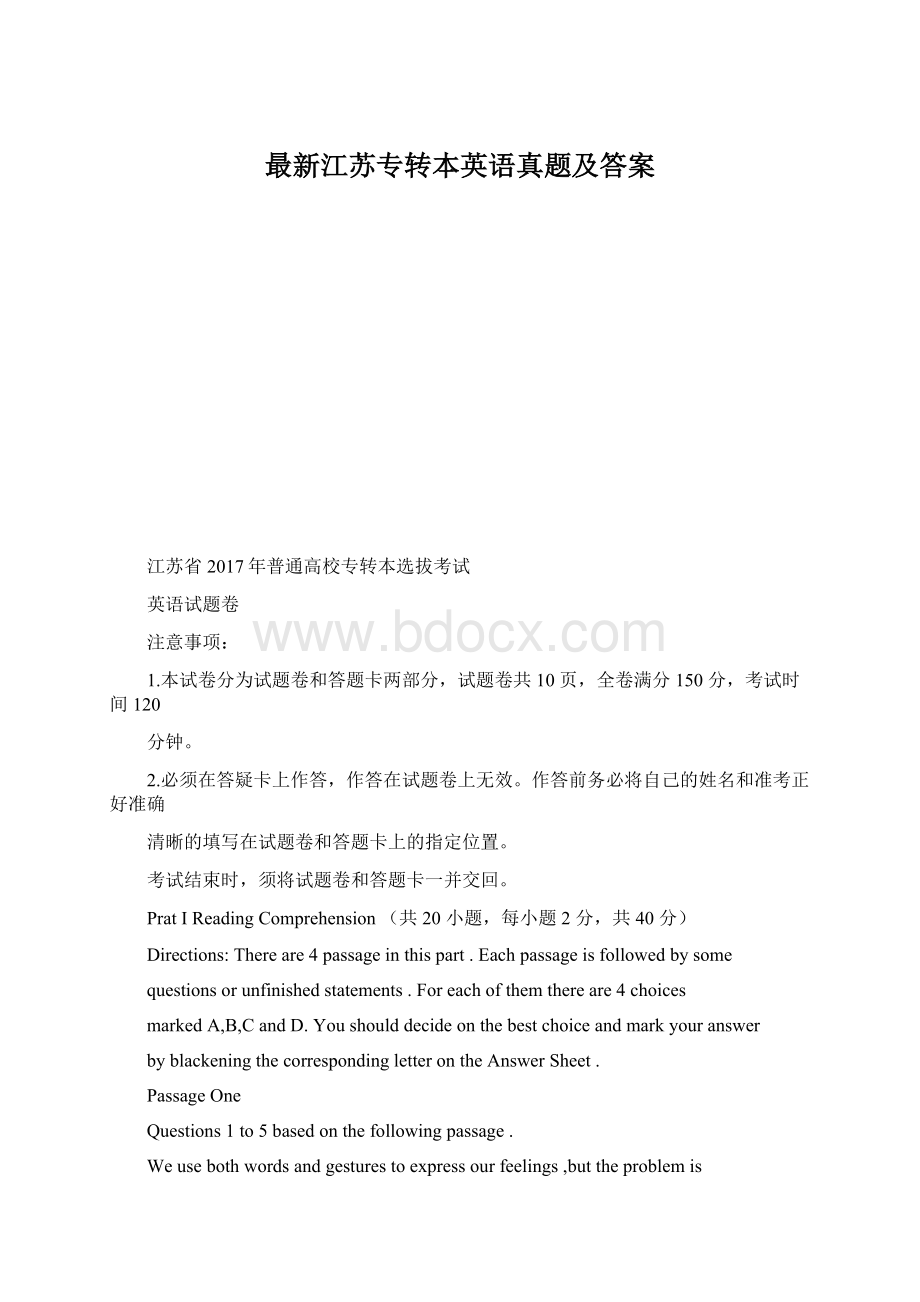最新江苏专转本英语真题及答案.docx
《最新江苏专转本英语真题及答案.docx》由会员分享,可在线阅读,更多相关《最新江苏专转本英语真题及答案.docx(27页珍藏版)》请在冰豆网上搜索。

最新江苏专转本英语真题及答案
江苏省2017年普通高校专转本选拔考试
英语试题卷
注意事项:
1.本试卷分为试题卷和答题卡两部分,试题卷共10页,全卷满分150分,考试时间120
分钟。
2.必须在答疑卡上作答,作答在试题卷上无效。
作答前务必将自己的姓名和准考正好准确
清晰的填写在试题卷和答题卡上的指定位置。
考试结束时,须将试题卷和答题卡一并交回。
PratIReadingComprehension(共20小题,每小题2分,共40分)
Directions:
Thereare4passageinthispart.Eachpassageisfollowedbysome
questionsorunfinishedstatements.Foreachofthemthereare4choices
markedA,B,CandD.Youshoulddecideonthebestchoiceandmarkyouranswer
byblackeningthecorrespondingletterontheAnswerSheet.
PassageOne
Questions1to5basedonthefollowingpassage.
Weusebothwordsandgesturestoexpressourfeelings,buttheproblemis
thatthesewordsandgesturescanbeunderstoodindifferentways.
Itistruethatasmilemeansthesamethinginanylanguage.Sodoes
laughterorcrying.Therearealsoanumberofstrikingsimilaritiesinthe
waydifferentanimalsshowthesamefeelings.Dogs,tigersandhumans,for
example,oftenshowtheirteethwhentheyareangry.Thisisprobablybecause
theyarebornwiththosebehaviorpatterns.
Fearisanotheremotionthatisshowninmuchthesamewayalloverthe
world.InChineseandEnglishliterature,aphraselike“hewentpaleand
begantotremble”suggeststhatthemaniseitherveryafraidordeeplyshocked
.However,“heopenedhiseyeswide”isusedtosuggestangerinChinese
whereasinEnglishitmeanssurprise.InChinesesurprisecanbedescribedin
aphraselike“theystretchedouttheirtongues”.Stickingoutyourtongue
inEnglishisaninsultinggestureorexpressesstrongdislike.
Eveninthesameculture,peopledifferintheabilitytounderstandand
expressfeelingsExperimentsinAmericahaveshownthatwomenareusually
betterthanmenatrecognizingfear,angerloveandhappinessonpeople’s
faces.Otherstudiesshowthatolderpeopleusuallyfinditeasierto
recognizeorunderstandbodylanguagethanyoungerpeopledo.
1.Accordingtothepassage,_________.
A.wecanhardlyunderstandwhatpeople’sgesturesmean
B.wordsandgesturesmayhavedifferentmeaningsindifferentcultures
C.wordscanbebetterunderstandbyolderpeople
D.gesturescanbebetterunderstandbymostofthepeoplewhilewordscannot
2.People’sfacialexpressionsmaybemisunderstandbecause______。
A.peopleofdifferentagesmayhavedifferentunderstandings
B.peoplehavedifferentcultures
C.peopleofdifferentsexesmayunderstandagesturedifferently
D.peopleofdifferentcountriesspeakdifferentlanguages
3.Eveninthesameculture,people_______.
A.havedifferentabilitiestounderstandandexpressfeelings
B.haveexactlythesameunderstandingofsomething
C.neverfailtounderstandeachother
D.areequallyintelligent
4.Fromthispassage.wecanconclude_______.
A.wordsareusedasfrequentlyasgestures
B.wordsareoftenfounddifficulttounderstand
C.wordsandgesturesarebothusedinexpressingfeelings
D.gesturesaremoreefficientlyusedthanwords
5.Thebesttitleforthispassagebe________.
A.WordsandFeelings
B.Words,GesturesandFeelings
C.GesturesandFeelings
D.CultureandUnderstanding
PassageTwo
Questions6to10arebasedonthefollowingpassage.
TheEnglishpolicemanhasseveralnicknamesbutthemostfrequentlyused
are“copper”and“bobby”.Thefirstnamecomesformtheverb“tocop”(
whichisalsoslang),meaning“totake”or“tocapture”,andthesecond
comesformthefirstnameofSirRobertPeel,a19thcenturypolitician,who
wasthefounderofthepoliceforceasweknowittoday.Anearlynicknamefor
thepolicemanwas“peeler”,butthisonehasdiedout.
Whateverwemaycallthem,thegeneralopinionofthepoliceseemstobea
favorableone,except,ofcourse,amongthecriminalpartofthecommunity
wherethepolicearegivenmorederogatorynicknameswhichoriginatedin
America,suchas“fuzz”or“pig”.VisitorstoEnglandseemtobevery
impressedbytheEnglishpolice.Ithas,infact,becausestandingjokethat
thevisitortoBritain,whenaskedforhisviewsofthecountry,willalways
say,atsomepointorother,“Ithinkyourpolicemenarewonderful”.
Well,theBritishbobbynotalwaysbewonderfulbutheisusuallyavery
friendlyandhelpfulsortofcharacter.Amusic-hallsongofsomeyearsago
wascalled“IfYouWantToKnowTheTime,AskAPoliceman”.Nowadays,
mostpeopleownwatchesbuttheystillseemtofindplentyofotherquestions
toaskthepoliceman.InLondon,thepolicemanspendsomuchoftheirtime
directingvisitorsaboutthecitythatonewondershowtheyeverfindtimeto
doanythingelse.
Twothingsareimmediatelynoticeabletothestrangerwhenheseesan
Englishpolicemanforthefirsttime.Thefirstisthatdoesnotcarrya
pistolandthesecondisthathewearsaverydistinctivetypeofheadgear,
thepoliceman’shelmet.Hishelmet,togetherwithhisheight,enablesan
Englishpolicemantobetimeitissuggestedthatthepolicemanshouldbegiven
apistolandthanhishelmetshouldbetakenformhim,butbothsuggestions
areresistedbythemajorityofthepublicandthepolicethemselves.
6.NowadaysBritishpeoplecallthepoliceman________.
A.pigB.peelerC.bobbyD.fuzz
7.WhichoffollowingstatementsisTRUE?
A.TherearefewercriminalsinAmericathaninBritain.
B.B.TheEnglishpoliceusuallyleaveadeepimpressiononvisitors.
C.TheEnglishbobbyisfriendlybutnothelpful.
D.TheEnglishpoliceenjoyhavingpistols.
8.IfyouseeanEnglishpolicemanforthefirsttime,youwillprobablynotice
atoncethat_______.
A.heoftentellspeopletime
C.hehasahelmetonthehead
B.heisusuallyveryhelpful
D.hewearsspecialclothes
9.ThatanEnglishpolicemancanbeseenformsomedistanceis______.
A.astandingjoke
B.ofnohelp
D.ofsomehelp
C.strangeandfunny
10.VisitorspraisetheEnglishpolicebecause______.
A.theyarepoliceandhelpful
C.theyoftengivethanks
B.theyobeyorders
D.theyarearmedwithmodernequipment
PassageThree
Questions11to15arebasedonthefollowingpassage.
Itisdifficulttoimaginewhatlifewouldbelikewithoutmemory.The
meaningsofthousandsofeverydayperceptions,thebasesforthedecisionswe
make,andtherootsofourhabitsandskillsaretobefoundinourpast
experiences,whicharebroughtintothepresentbymemory.
Memorycanbedefinedasthecapacitytokeepinformationavailablefor
latterforlateruse.Itnotonlyincludes“remembering”thingslike
arithmeticorhistoricalfactsbutalsoinvolvesanychangeinthewayan
animaltypicallybehaves.Memoryisinvolvedwhenaratgivesupeatinggrain
becausehehassniffedsomethingsuspiciousinthegrainpile.Memoryisalso
involvedwhenasix-year-oldchildlearnstoswingabaseballbat.
Memoryexistsnotonlyinhumansandanimalsbutalsoinsomephysical
objectsandmachines.Computers,forexample,containdevicesforstoring
dataforlateruse.Itisinterestingtocomparethememory-storagecapacity
ofacomputerwiththatofahumanbeing.Theinstant-accessmemoryofalarge
computermayholdupto100,000“words”—readyforinstantuse.Anaverage
Americanteenagerprobablyrecognizesthemeaningofabout100,000wordsof
English.However,thisisbutafractionofthetotalamountofinformation
whichtheteenagerhasstored.Consider,forexample,thenumberoffaces
andplacesthattheteenagercanrecognizeonsight.
Theuseofwordsisthebasisoftheadvancedproblemsolvingintelligence
ofhumanbeings.Alargepartofaperson’smemoryisintermsofwordsand
combinationsofwords.
11.Accordingtothepassage,memoryisconsideredtobe________.
A.thebasisfordecisionmakingandproblemsolving
B.theabilitytostoreinformationforfutureuse
C.anintelligencetypicallypossessedbyhumanbeings
D.thedatamainlyconsistingofwordsandcombinationsofwords
12.Thecomparisonbetweenthememorycapacityofalargecomputerandthatofa
humanbeingshowsthat______.
A.computer’smemoryhasalittlebiggercapacitythanateenager’s
B.computer’smemorycapacityismuchsmallerthananadulthumanbeing’s
C.computer’smemorycapacityismuchsmallereventhanateenager’s
D.computer’smemorycapacityisthesameasateenager’s
13.Itisimpliedinthepassagethat______.
A.onlyhumanbeingshaveproblem-solvingintelligence
B.aperson’smemoryisdifferentfromacomputer’sineveryrespect
C.animalscansolveverysimpleproblems
D.animalssolveproblemsbyinstinctratherthanintelligence
14.Thephrase“intermof”inthelastsentencecanbebestreplacedby
“______”.
A.inconnectionwith
C.consisting
B.expressedby
D.bymeansof
15.Themainideaofthepassageis________.
A.whatlifewouldbelikewithoutmemory
B.memoryisofvitalimportancetolife
C.howaperson’smemoryisdifferentformananimal’soracomputer’s
D.whatmemorycarries
PassageFour
Questions16to20arebasedonthefollowingpassage.
Clearlyifwearetoparticipateinthesocietyinwhichwelivewemust
communicatewithotherpeople.Agreatdealofcommunicationisperformedona
person-to-personbasisbythesimplemeansofspeech.Ifwetravelinbuses,
buythinginshops,oreatinrestaurants,wearelikelytohave
conversationswherewegiveinformationoropinions,receivenewsorcomment
andverylikelyhaveourviewschallengedbyothermembersofsociety.
Face-to-facecontactisbynomeanstheonlyformofcommunicationand
duringthelasttwohundredyearstheartofmasscommunicationhasbecomeone
ofthedominatingfactorsofcontemporarysociety.Twothings,aboveothers,
havecausedtheenormousgrowthofthecommunicationin